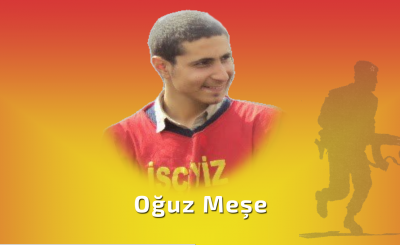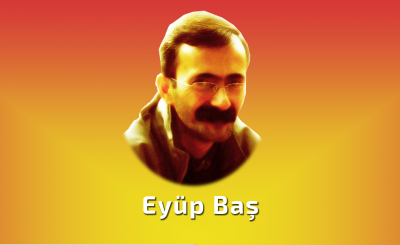Orhan Ogur was a young man of 22.
Orhan Ogur was born on March 3, 1981 in Istanbul. On the one hand he went to school, on the other, he worked in restaurants, textile factories, moved cargoes, and also worked in pastry shops and in markets. He became better acquainted with the places where the system’s exploitation is at its worst. He started to take up his place in the struggle when he was 16. At the end of 1998 his relationship with our movement took on an organised form. He sought to develop the struggle and the organising of our people in the shantytown districts such as Nurtepe, Guzeltepe and Armutlu.
He was a revolutionary. For this reason, on November 6, 2001 he was jailed and put in the F-Type prisons.
In Tekirdag F-Type Prison cells he experienced attacks every day on his honour and his personality. He resisted alongside his comrades.
In July 2002, on the pretext of carrying out a search, the authorities entered the cell Orhan Ogur shared with two other prisoners and all three prisoners were tortured. As a result of this attack, Orhan Ogur’s body was bruised in many places, his fingernails were broken and he was soaked in his own blood.
But even this was not enough for the torturers. Despite the fact that Orhan and the other two prisoners made a formal complaint about the torture to which they had been subjected, they themselves were deemed to be the “guilty” ones and the prison administration “punished” them with six months’ discipline and a ban on correspondence for 45 days!
Because the plumbing was broken they could not meet their needs for days and were neither able to clean themselves nor wash their eating utensils, so they did not eat at all. They could not use the toilet because of the stench and filth.
That is the image presented by the prisons Cemil Cicek considers to be so “peaceful and calm”.
The prisons of a Susurluk (*) minister put people like Orhan Ogur in solitary confinement, while people like Sedat Peker enjoy luxury treatment!
Later Orhan Ogur was put in an isolation cell.
Finally, a short time ago, the pretext of a search was again used to attack him in his cell.
What is particularly striking about this is why the “search” came about.
Orhan Ogur was put in an isolation cell near the cells occupied by the fascist mafioso Sedat Peker and other mafiosi. A search of the mafia members’ cells turned up a computer and a telephone. (Since Cemil Cicek has openly defended those involved in Susurluk, it is unthinkable that any of them would be without a telephone while he is Justice Minister… Even if mafiosi lose a phone as a result of a search it won’t be long before they get a new one.)
But because a computer and a phone had been found on the mafia prisoners, the soldiers again searched and attacked Orhan and prisoners like him.
After this attack Orhan said, “I can’t take this any longer, something has to be done”, and he set himself on fire. At the moment where he lost the power to resist tyranny any longer, he turned his death into a protest against tyranny, even if it was not the result of a decision taken by us.
(*) Susurluk, a town in western Turkey, is the name of a scandal that erupted there in November 1996 when a car crash revealed some of the links between the police, organised crime, fascism and parliament. Cemil Cicek and others have defended those caught up in Susurluk on the grounds that they were supposedly acting to defend the state.




